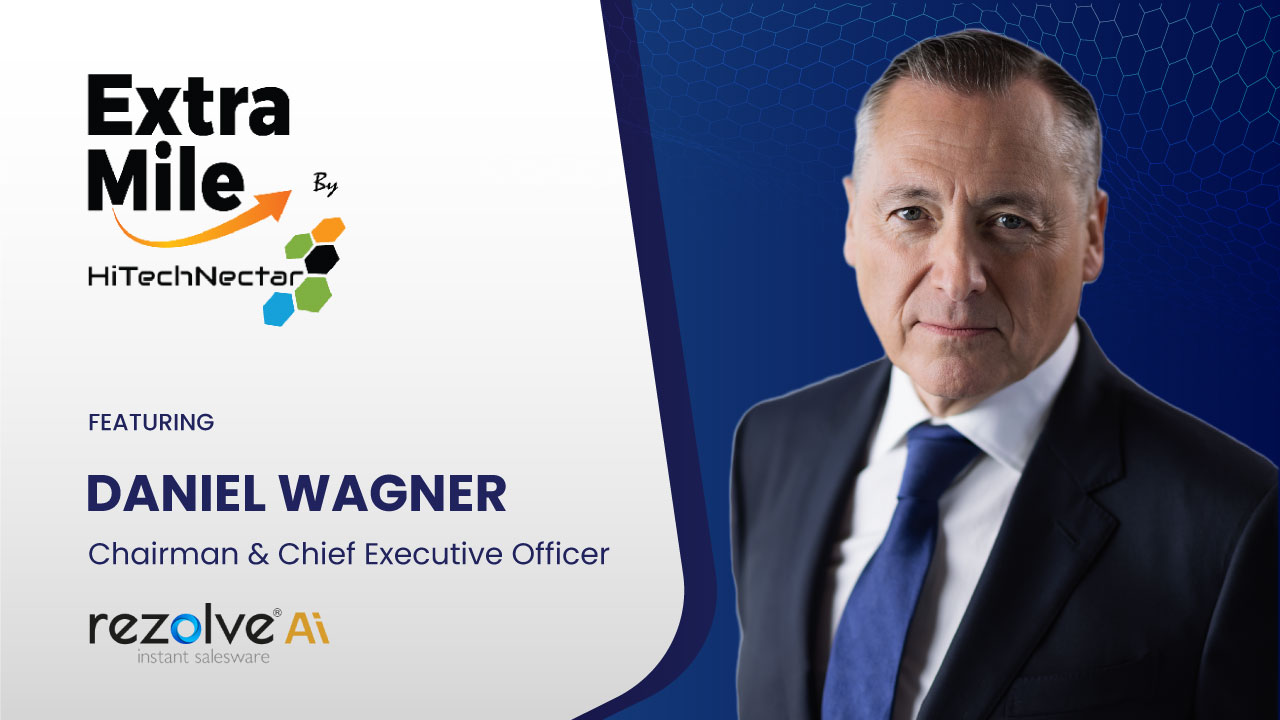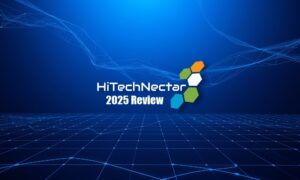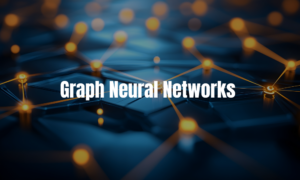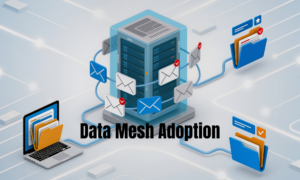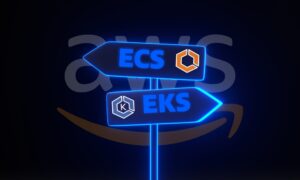Host: Hello everyone, and welcome to another episode of Extra Mile by HitechNectar, an interview series that bridges the gap between industry leaders and enthusiasts. I am your host Sayali, and we are here to discuss the latest innovations, tech trends, marketing practices, expert insights, and a lot more. Today, we are thrilled to have Mr. Dan Wagner with us, the Founder, CEO, and Chairman of Resolve AI, a platform that’s transforming the retail experience. Let’s explore Dan’s remarkable career, his expertise, and learn more about Rezolve AI solutions and the latest in AI technology. Welcome Dan, we are so glad you could join us today.
Daniel: Thank you very much, it’s very good to be on HitechNectar. Thank you for inviting me.
Host: So, Dan, could you please give our audience a quick introduction?
Daniel: Yes, so I run a company called Rezolve AI, and we are a platform that owns a proprietary large language model, Gen AI large language model, that we use to improve the experience for e-commerce and digital engagement. So today, most consumers interact with digital platforms in a kind of very prescriptive way. So if I wanted to find a new television on an electronic site, I would start by saying, you know, I want a TV, and then I get a set of results, and then I might limit by the size of the screen, and maybe my price range, and then I would limit by maybe some brands that I like, and I’m filtering, filtering, filtering, and then I get a set of results, and then sometimes I won’t necessarily know the difference between one television and another, like maybe the Sony or Samsung, I don’t know which one is better. But when you go into a physical store, if you have a decent salesperson that you are talking to, then the experience is very much more rewarding, because I can ask a question of the salesman, which is better, the Sony or the Samsung?
You can’t do that kind of thing on a digital platform. So, we have a suite of products that solve problems like that. One of our products is called Brain Commerce, and it allows a consumer, instead of doing this filter, filter, filter, filter, I could just say to the digital platform, by typing or by speaking, I’m looking for a flat screen TV, I’d like it to be about 60 inches, I don’t want to spend more than £1,000, $1,000, which one would you recommend?
I’d like a well-known brand, which one would you recommend? And the answer that I would get back from Brain Commerce is as if I’m talking to the very best salesman on the planet. So that is our proposition there.
And then I can do that in any of 95 languages. So, if I’m a natural Spanish speaker, but I happen to be living in America, or living in the UK, or living in France, it can be a bit more difficult to explain and to understand that correspondence with even a physical person, even a real person. But we cater for that as well with Brain Commerce.
So, we allow consumers to engage with digital platforms by using standard normal language and getting very, very rich, valuable responses. Our second product is Brain Checkout, which allows a very fast checkout, but also allows us a very innovative way to engage with customers based on where they are, like geolocation, or based upon maybe what they are doing, right. So, we have social media triggers, and we have triggers for television.
So, an audio trigger embedded in an audio stream can wake the phone up and allow me to engage instantly. So, for example, I might be watching a television commercial for a BMW car, and my phone, which is sitting next to me typically, will wake up and say, do you want to test drive? Now I can ignore it, flick it away, or just not do anything.
Or I could go, you know what, yeah, I do tap tap. So, it’s a very instant interaction. And then finally, we have a product called Brain Assistant, which is the last piece of a commerce journey.
It’s when you are you have a problem with the order didn’t arrive, or it’s the wrong size, or it’s broken, and you have to engage with the customer service agents and get on the phone and manage the process. And Brain Assistant manages that using Gen AI as well. So, it’s a very rewarding, you know, no wait time, very rich experience.
So those are our three products. And they basically address the problems that we think exist in the engagement with digital platforms.
Host: Right in the middle of revolution and conversational AI.
Daniel: Basically, that’s what yeah, conversational AI, conversational commerce, we like to call it.
Host: All right. You’ve been in tech for decades, Dan, what was it like starting MAID back in 1984, before the internet was a household name? Can you like take us back and share what that was like?
Daniel: Okay, so I kind of got a bit lucky, because I was working in an advertising agency, and British Telecom, which is the main telecommunications provider in the UK at the time, and still are, came to see the agency and said, we are very excited about a new product, which is fax machines. And what these products can do is you put a machine at one end of the telephone line, you put another machine at the other end of the telephone line, and you can send pictures and documents from one place to the other. So, I was really I was a young man at the time.
And I was absolutely amazed by this, right? I’ve never, you’ve never seen anything like this at the time. So, somebody in Australia could send a piece of paper to a fax machine in London, it would come out instantly.
And so, I went to see British Telecom. And I did some research, I asked them, you know, how does this actually work? And they said, well, it’s actually data communications, that’s going down, we’re sending data down the telephone line.
And the guy who was explaining this to me, some very sophisticated, very intelligent guy, Riti, he said to me, actually, you know, you can ask questions of a computer at the other end of this telephone line. I said, What do you mean? He said, well, if you have a computer, and it’s got lots of data on it, you can ask it questions.
And so, I left the place with my head spinning. And very shortly after I left the job and set up the first commercial online platform, which was called made back in time, we changed the name to dialogue information services later on. And basically, I licensed all the newspapers in the UK.
And then I went on to license the newspapers in all the major cities around the world. Because I was the first to do it, everybody gave me the rights exclusively to deliver their content online. And that’s what basically gave me the platform to build the market leader, the world leader over the next 16 years.
And of course, during that period, I had to learn and build data centers, I had to learn and build search technology. And I had to learn and build commerce technology, because none of those things existed in 1984, which is when I started the company. In fact, Tim Berners-Lee, the founder, what who is known to be the founder of the World Wide Web, presented the concept of the World Wide Web in 1989, five years after I started the company.
And in 1992, was the first time we started using www. So, I started made eight years before we started using www. I mean, that’s a long time.
And so, we were using the internet, but not in the way, not in the way that we are familiar with today, which is with a browser.
Host: Wow, it’s exceptional to see how you anticipated the potential of online platforms so early on.
Daniel: Well, I wouldn’t like to take credit for that. Because I think, as I said before, I kind of got lucky I was it was exposed to me. And I just thought to myself, if BT if they think this is a huge opportunity, this is going to change the world, you know, which is kind of how it was described to me, then I should jump onto this.
And you know, I should be doing something. And then, you know, I just thought about a good idea. But then after I sold that business in 2000, which was the information business, I started two other companies, one, which was a commerce business or vendor, but went on to become the European market leader for e commerce.
It was a cloud software as a service platform. And in the US, we ran large sites like Neiman Marcus, Land’s J. Crew, LL Bean, Under Armour, and others before I sold that business to Oracle in 2014.
But that business became European market leader for e commerce, enterprise e commerce. And another company I set up was a company called attract, which provided search technology, just search technology to commerce providers and to companies that needed to search their internal material. And that business listed on the London stock market in 2014, and then was sold in 2019.
So, when you come to rezolve, it has all the elements of my life, kind of in this company, it’s got my DNA all over it, you know, because it’s a retail commerce search with gen AI platform, you know, with, you know, with all of the obviously software as a service. So, all of the things that have shaped my career are embedded into this new proposition that we have.
Host: So just adding on to that, you have had successful ventures, like you mentioned before, like Wenda, Power, and Attract. So, were there any challenges, like massive challenges you faced and how you tackled them?
Daniel: Yes. And, you know, actually, the precursor to resolve, which was called Power, did not work out so well. I think that the it was very, you see, at that point in time, when I started this company Power, the feeling was that I was going to make a great success of it, because my previous companies have been a great success.
And so, there was an expectation that it would be a great success, and not just from the outside, but also for me, right? I mean, I assumed it’d be a great success. And to be fair, I thought it would be because all entrepreneurs are dedicated to achieving their goals.
So, it never occurred to me that it wouldn’t be successful. And it never does. It never occurs.
I don’t think any entrepreneur goes into any business feeling anything other than total confidence that they’re going to make a success of it. Otherwise, they probably won’t make a success of it. And that was the case with Power.
But Power was very early, again, like my previous businesses in mobile commerce, mobile engagement, and the kind of things we’re doing at Rezolve. And we consumed a lot of money in building out international infrastructure and business presence. And I think that, you know, we were too early, you know, we basically ran out of money.
But there was some mitigating factors, circumstances where there was some, let’s call them bad actors, who felt that there was an opportunity to take the company. And so, there was a kind of hostile at the end of it, there became a very hostile kind of takeover process that ultimately failed. So, the whole thing went down.
But immediately after that, literally within a matter of days, after I got over the initial shock of the business failing, which was very new to me, okay, me and my team started Rezolve, because we believed that what we were doing was innovative and exciting, and had enormous potential. And we weren’t prepared to let it go. And it’s been another journey of eight years in Rezolve to get to this point where we’re now listed on NASDAQ and have a very exciting technology base and products and momentum.
Host: All right. So, Rezolve AI is transforming online shopping with its AI brain solutions. I know you did speak about it earlier, but could you tell us more about brain commerce, brain checkout and brain assistant?
Daniel: Yes. So, you know, every eCommerce manager or eCommerce director today is worrying about one thing. And that is how do they improve the, or how do they reduce checkout attrition.
So, everybody who arrives at the website, out of everybody arrives, seven out of 10 drop out of the flow. Now, they drop out of the flow for lots of reasons. And we’re the consumers too, right?
You are a consumer, you’ve been online, and you know, you know, the same reasons that everybody drops out. It’s all the same, right? And the reasons are this, not quite sure this is the right product for me.
I don’t know if it will plug into the right thing. I don’t know if it’s the right color that I’m looking at here, if it’s if it’s going to go with something that I’ve got at home, or, or I don’t know if it’s going to be the right size, or I don’t know if, you know, it’s going to do the things I think it will do or whatever. That’s one reason.
Another reason is that you start to go through a checkout flow that has too many steps in it. And while you’re going through the steps, you change your mind, right? Because it’s easy to change your mind, there’s no embarrassment.
When you’re standing in a physical store, and you’re standing in a queue or a line, and there’s people behind you, and there’s people, there’s two people in front of you will think and you’re starting to think twice about the product, very difficult to step out of that line emotionally. So physical retail stores have very low levels of attrition in a checkout flow. And physical retail stores address the problem of not knowing the answers by providing staff who answer those questions for you.
Okay. Now the digital situation, the digital equivalent of that is assumes a lot of knowledge from the consumer. Like if you go to a tech, using the electronics example, if I go to an electronics site to buy a TV, it kind of expects you to know what an OLED screen is, or a UHD 4k is, I mean, a lot of people don’t know what that is.
So, when I’m looking at the one television versus one screen versus another screen, and one’s UHD 4k, and is more expensive than the other one isn’t UHD 4k, I don’t know whether it’s worth paying extra money. I don’t know whether the refresh rate of the screen means anything to me. I don’t know a lot of these things, right, whether it’s got a SCART plug, right, or, you know, so these technical things that are presented to me, for a lot of the consumers, they don’t make any sense at all.
If I’m in a store, and I’m talking to a salesman, and he says, there’s a SCART plug and a UHD, I say, well, what’s UHD? Oh, it’s very high quality, the image, let me show you, it’s fantastic colors in dark rooms, or in bright environments, the screen is much brighter than it would be otherwise, and you know, explain it to me. Oh, okay.
So, what we’ve done with Braincommerce is we’ve, replicated that, so that when I, if I’m going through any product discovery, I can ask questions, difficult questions, and I will get good answers to it. That’s what we do. It’s very, very cool, actually.
And it allows me to speak to the digital sales person. I mean, it’s just technology, but it allows me to, as if I’m talking to a human being who’s very, very knowledgeable. And so, all my questions can be answered.
I mean, unless I’m asking a question that doesn’t make any sense, it’s very likely because what we do is we ingest the user manuals, we ingest, obviously, the product information, but user manuals and other material that’s related to televisions, so that when I’m talking to the gen AI, I’m very, it’s a very knowledgeable salesperson on TVs. And we trained it to be empathic, empathetic, and to have empathy, and we’ve trained it to be to know how to close so that when I’m talking to the sales, there is that natural sales activity going on, even though I’m talking to a gen AI engine. So, it’s very, an interesting and different and much more rewarding experience.
And then of course, the checkout, we try to make that as elegant as possible to prevent people from changing their minds, tap tap. So, if you’ve got a tap tap to check out, once I’ve got all the answers, I go, you know what, tap tap, and then I’ve bought it. Now, that’s really what we do.
We’re trying to improve, or let’s put it this way, we’re trying to level up the experience of shopping on the internet and shopping through digital platforms.
Host: So, this reminded me of the line that I read in an interview of yours, where you mentioned Rezolve AI is not just participating in the AI revolution, it is seeking to be a leader in the AI solutions for the digital commerce market. And everything is coming in the picture now. So, Dan, your approach to going above and beyond in the tech space is commendable.
And congratulations on Rezolve AI’s debut on NASDAQ as one of the first pure play AI companies to go public. What does this milestone mean for you and the company?
Daniel: I think that being a public company, because we’re very ambitious with the product set that we have the opportunity, we think to innate to be the foundation and the platform that you know, most retailers will use, then I am, I feel that being a public company allows us the ability to get high visibility, but also to use our paper, our public paper, to acquire businesses so that we get footprints in markets that we won’t, we can’t get into right away. So, I’ll give you an I’m operating in North America, and continental Europe and Europe, basically.
But they may, there’s, you know, Brazil is a huge market. India is a huge market, China is a huge market. And we can’t necessarily win in all of these markets by just simply putting salespeople into those markets and trying to build it up.
So, acquisition allows us the opportunity to move quickly into markets by buying a presence in that market already, and then growing that presence thereafter. So that’s, you know, why a public listing, a public market gives us that potential.
Host: Indeed, a great moment for the entire team of Rezolve AI.
Daniel: I’m sorry?
Host: It’s indeed a great moment for the entire team at Rezolve AI by going into a public listing.
Daniel: Absolutely. I mean, I think it’s an it’s extremely important moment for everybody who’s involved in any company, making it to the public markets, but we see it as the beginning, not the end of the journey. We see it as the very, very beginning of the journey.
And that’s, you know, that’s how we feel. We don’t we feel that this is just the beginning. And to be honest with you, it is the beginning.
I mean, we didn’t go public as a culmination of a fantastic journey of success. We’ve come to the markets as a business with fantastic potential. And now we have to execute on that potential.
And that’s what we’re going to do. So, but we give the opportunity for investors to come in and back us, you know, they they can now they understand what we do. We’re sitting at the beginning of probably the most exciting tech revolution that I’ve seen in my entire life.
And I’ve been around, as you know, for quite a bit with some exciting things that have developed, but Gen AI and the opportunity and the transformative nature of it in terms of every single industry that it touches is probably the most exciting development and technology that I’ve seen. And so, I’m very proud and excited to be sitting in a vertical of retail and commerce with a fantastic set of products that we think are, you know, incomparable in the market today, and with the potential to capture that momentum and growth. So, we’re very excited to be here.
Host: Right. So, moving forward with AI rapidly growing, what are the key benefits of making it accessible to all the companies? And how does it impact businesses success and efficiency?
Daniel: Well, I think the key thing is just going back to what I said at the very beginning of this call, which is that e commerce directors and e commerce managers are trying to improve or reduce the attrition in their checkout flow and when people arrive at their sites, and seven out of 10 people drop out. So, if we can improve that by just a small amount of percentage points, then the revenue in those businesses go up dramatically. And so that’s really what this is about.
If I can give those e commerce managers an opportunity to reduce the attrition in their checkout flow, that’s going to have a massive impact to their business. But it’s also going to have a better a wonderful impact to the consumers who arrive at this site, they’re going to get a much better experience than they get today. In the example I gave you.
Host: As we can see, you’ve always stayed ahead of the tech trends. How do you keep up with advancements and ensure your business stay cutting edge?
Daniel: Well, you know, I’m very lucky because I really enjoy new things and exciting developments. And my career has allowed me to learn all about commerce and all about search and all about, you know, hosting, you know, infrastructure. And so, I’ve learned on the job.
I’m not a technical guy. But I’m an interested person. I’m a curious person.
And so, I’ve learned a lot along the way. And now, you know, my knowledge and my experience gives me the competitive advantage of knowing what to do, you know, I know what to do now. And I know how to take advantage of this wonderful technology developments that we’re seeing in AI.
So, combination of that, really, I think, I think experience and knowledge, obviously, is a very important factor in being successful. And, you know, I happen to be I think I happen to be at the right place at the right time with the right abilities and capabilities.
Host: Amazing. Dan, could you explain the importance of having your foundational large language model? Like, how does this set you apart from the competitors?
Daniel: Yes, it’s a very good question. Now, most of our competitors who have foundational large language models, are investing in them heavily to train them on everything. It’s a model that I think is flawed, because I think that, you know, everybody’s competing with everybody, but to try and be the fountain of all knowledge.
And we’ve decided we started building our foundational language model back in 2018. And our focus was to try to build a model that was the best salesman on the planet. That was what I was coming at the whole time, I was thinking, I want to create a gen AI platform that is the best salesman on the planet.
So, we had to do a lot of things to make that a reality, which we, you know, which we’ve done. And so, what sets us apart is that if you want to try to replicate what Rezolve is doing, as a company, you can go to open AI, or Anthropic, or Mistral, or Kahir, or, you know, one of these other players in the market who have their own foundational language model, and you can then try to train it to be a great salesperson. It’s more difficult than you think, by the way.
And, and we spent the last six years doing that. So, you know, that I think that the, the companies don’t want to do that. And they’re not very well equipped to do that, to do it well.
So, we come to them and say, look, we’ve already done it, just give us your product catalogue. And we’ll create the best salesman for you in a matter of days, and give it back to you. And you can put it on your site.
So, it’s, it’s completely different to saying, I’m going to go and get a language model and try and train it to be a salesman, and then try to build products on the top of that to deliver to my customers in 95 languages, and so on. That’s a big, big undertaking, and that requires some really, really knowledgeable, capable engineers who are AI and Gen AI trained. And it will take a long time.
So, we have a competitive advantage in that we’re the first and the only right now, AI company that’s focused on creating the best salesman on the planet. And I think that there’s a lot of, I think everybody wants that. Everybody wants the best salesman to sell their products, right?
So, if you can get the best salesman to sell your products, then you’re going to want to take that on. And that’s what we’re offering.
Host: Impressive. Now, finally, how do you balance innovation with practical implementation? And what advice would you give to new entrepreneurs and tech leaders?
Daniel: So, I’ll start, there’s two questions there. So, I’ll answer the first. The first one is that, you know, again, experience has a lot to play here.
We spent eight years honing this product and getting it ready for market. And one of the things that we did was integrate with all the major commerce platforms, e-commerce platforms, and integrate with all the major payment providers so that when we come to a merchant, we can say, here is our technology, what platform are you sitting on? Oh, I’m sitting on Magento, or I’m sitting on Shopify, or I’m sitting on Salesforce Commerce Cloud, or whatever.
And we say, okay, great. And then what payment provider are you using? You know, I banked through, I don’t know, Wells Fargo.
And we go, right, well, you go click, click, click, click, click, and you’re done. So, what we’ve done is we’ve made that whole process of adoption, not technology dependent. And therefore, it means that it can be implemented very quickly.
So now the whole process of decision making and delivery is contracted down to a commercial discussion rather than the technical one. So that’s the answer to your first question. And that comes from experience.
We went into this knowing that a barrier is I’d love to use it now, I need to allocate resources, I need to get my engineers to integrate and do the work. Oh, I can’t do that right now. I’ve got a pipeline of other things, it’s going to have to be next year.
And so that process, we’ve tried to bypass that process. And then the second question you had was, what advice would I give to budding entrepreneurs? Is that right? Was it advice?
Host: Yes, what advice would you give?
Daniel: There’s only one thing that marks out successful businesses to failures. There’s only one thing, in my view, there’s only one thing that marks out success versus failure. And it is resilience and absolute commitment to never give up.
And even when everyone says, well, it’s all over now, there’s an opportunity for it not to be. And there have been situations in my career, many situations where, you know, all hope had been lost, appealingly, right, where we’d run out of money, there was nothing to be done. And yet, the only thing I was doing was seeing new investors, you know, I wasn’t sitting around thinking, oh, you know, it’s all over now.
You know, I was convinced that I would find somebody who would give me some more money to keep going. And in all cases, apart from when there was a bad actor involved, in all cases, that’s what’s happened. So, I think that, you know, Reid Hoffman, the founder of LinkedIn, I think said the best analogy for being an entrepreneur.
He said, being an entrepreneur and starting a business is like jumping off a cliff and building the plane that’s going to fly you to safety on the way down. And I think a lot of people when they’re going, they’re coming off a cliff, and they’re falling towards the ground, they’re thinking about closing their eyes and saying their prayers. But entrepreneurs don’t think like that.
Or winners don’t think like that. Winners think I’m not going to die, I’m not going to hit the ground, I’m going to build the plane, it’s going to get me to safety. And okay, that’s a bit of an extended analogy.
But you know what I mean. So, I think the point that the only advice I’ll give to entrepreneurs is you can always get there, you can always succeed, you just need to be totally committed, never give up.
Host: Thank you for that solid advice. Just to conclude this on a light note, when you’re not leading the tech world, what do you enjoy doing to unwind?
Daniel: Like everybody else, I like to watch Netflix and, you know, watch TV and I like to and I’m a football supporter. I like watching football as my chosen sport. I used to play a lot, but I don’t not so much anymore.
So, you know, I like to do very simple things, watch TV, watch football, you know, do a bit of exercise, go for a walk, nothing. I’m not I’m not you know, a social butterfly or you know, going around and I’m not a network, you know, to all of the different events want to make sure I go to all these different events. And this and the other never really was, you know, I’ve always been a bit of a homebody.
The thing that I that drives me is driving my business. I’m really energized by that. It excites me.
And I love what I’m doing. I love what I’m doing at the moment. I love the job I’ve got.
I love every day, the challenges that I have, even if they’re difficult challenges. I love dealing with them. You know, I enjoy it.
So that’s kind of what it that’s what drives me.
Host: Thank you for sharing your vision and experiences with us today. We appreciate your time and expertise. Thank you so much.
Daniel: Oh, it’s a pleasure. It really is a pleasure. Thank you very much for inviting me.
I’m very pleased to have been invited. It’s been a lot of fun.
Host: Thank you everyone for joining us. I am your host Sayali signing off for today. We’ll see you in the next episode of Extra Miles by HitechNectar with our next extraordinary leader on board sharing their thoughts.
Until then, stay tuned.
Explore Our Other Insightful Interviews:


